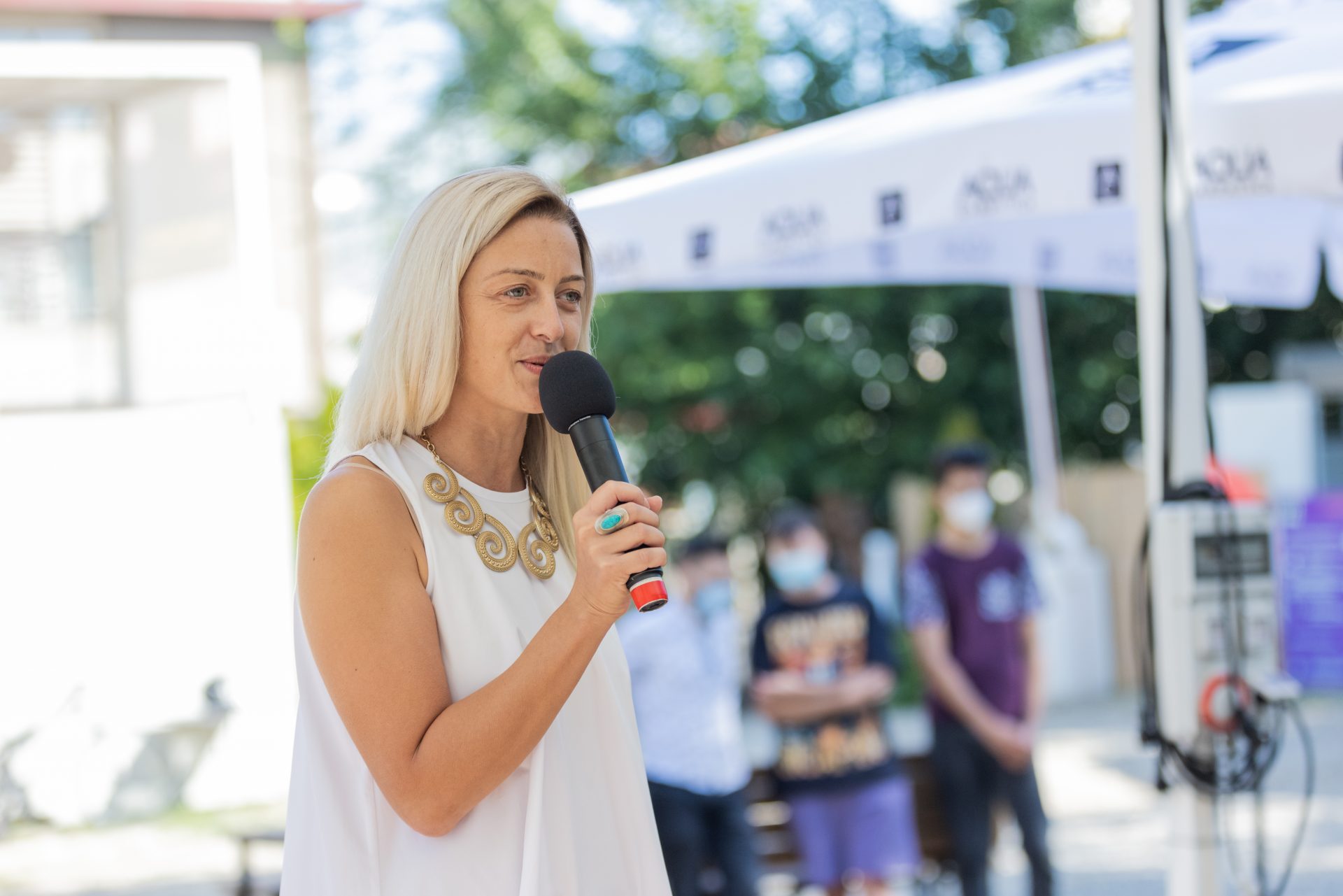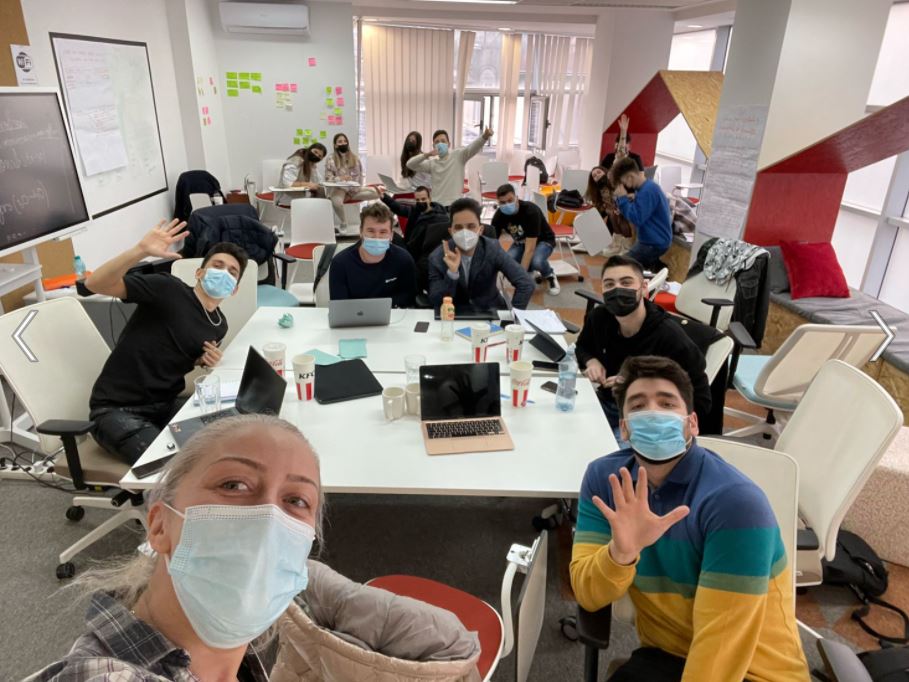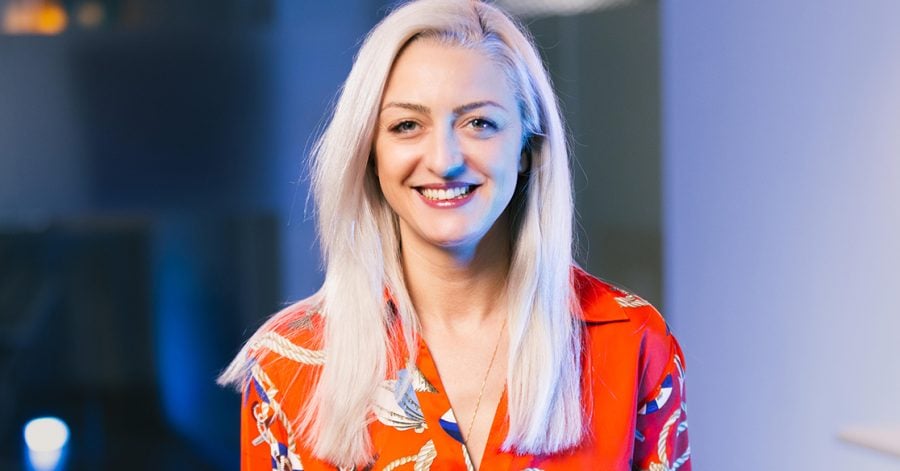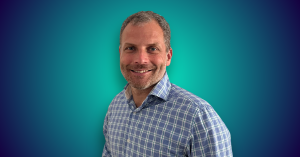In this new “Women in Tech” series, we will introduce you to talented tech professionals that are riding the wave of change in the most exciting tech companies and ecosystem organizations in our region. Having a strong and devoted team is one of the prerequisites of success for every startup venture and what investors are most often looking for, so we want you to meet the ladies who are making innovation happen.
We will explore different roles and jobs – from technical talents to professionals responsible for the growth and exploration of new markets, to IT jobs you haven’t even heard of, yet. We will also talk about what it is like to work in tech – the skills you need, the challenges you meet, the work environment that helps you thrive, and the future of work altogether.
Tech entrepreneurship can benefit a lot from visionary education models. This is why today we wanted to talk to the new COO at The Entrepreneurship Academy about her career path, lessons learned, and plans for 2022. With a background in computer science and a Ph.D. in Quantitative Methods in Business Administration, doctor Ioana Ceausu has always been focused on the IT industry.
Ioana has spent the last decade studying SMEs’ growth problems, as well as the impact of business accelerators on the performance of early-stage projects. She has been an associate professor at The Bucharest University of Economic Studies, a scientific researcher at the Humboldt University of Berlin, and in August 2019 she joined The Entrepreneurship Academy (EA) as a program manager.
This year, we find her at the helm of the Chief Operating Officer role, where she is set on growing the EA community.

THE RECURSIVE: Tell us about your entrepreneurial journey so far, and how did you land your current job?
IOANA CEAUSU: Education and entrepreneurship have been two of my biggest passions. I started my entrepreneurial adventure in high school, by publishing an “urban magazine”, called ORICUM, which failed. Then, I moved on to organizing the first innovation in technology competition, called I-Cube, and contributing to other entrepreneurial and NGO projects around education.
Further down the road, I started working in management and marketing consultancy. In parallel, I finished my studies at the Bucharest Economic Studies University (ASE) in the German department. Once I finished and had some experience with entrepreneurs, the question of scaling and high-growth businesses was on my mind:
I wanted to understand why so many cool entrepreneurial projects failed to make it big, despite the amazing founders and the innovative ideas.
This is how I started my first Ph.D. at Politehnica University in Bucharest on the topic of growth problems of small and medium enterprises – in 2011 “startup” was just a phase in the life cycle of a business. During these years, the challenges in the entrepreneurial ecosystem were still on my mind and I started a second PhD. on the topic of the impact of business accelerators on the performance of startups.
Then, EA – The Entrepreneurship Academy was launched in Romania, and I was keeping my eye on their evolution, since what and how they were approaching entrepreneurial education was very close to my values and aspirations. In the spring of 2019, I found out they were looking for a new Program Manager, I applied for the job, had some trips between Berlin and Bucharest to meet the team, and by July I had already moved back home and started the new role, feeling I had arrived exactly in the place I had worked and learned for until then: the perfect combination of education and entrepreneurial mindset.
Two and half years later, given my deep understanding of the vision on learning of EA, my need to be closer to the students (or team entrepreneurs as we call them at EA), listen to them, and support making the program the ignition event in their lives to achieve their potential, I moved into the new role of COO.
How would you explain to a 7-year-old what your job is?
My current job is about supporting, encouraging, and jump-starting young people to become their own superheroes.
What is it like to work for EA – The Entrepreneurship Academy, and what do you like most about their culture?
EA – The Entrepreneurship Academy is a place where two worlds collide: applied education and the entrepreneurial mindset. This is unusual for a university, especially in traditional higher education – where agility is not usually a strong point.
At EA, also because we are a small university, we have the privilege of being able to move fast, stay close to the team entrepreneurs, afford to have them included a lot in the decision-making process regarding the way we do things (e.g.: where to travel for their international experience – Amsterdam, America, India, Africa, Israel; certain workshops in their curriculum).
I believe that not in many programs do students claim they have “too much autonomy”. We support them to make their own decisions, to err in a safe environment, and offer the framework for them to reflect and learn from their mistakes. We do that as well, a lot – learn from our mistakes.
The EA team entrepreneurs challenge us constantly and keep us on our toes, and we get to be inspired by them every day. This motivates us to become every day better at creating the best environment for them to achieve their potential and succeed.
What have been the advantages and disadvantages of developing in your field as a woman?
My approach, throughout my professional life, was to be “gender blind”. I never thought, especially in my early adulthood, that being a woman might be an advantage or disadvantage.
This being said, I have been in many professional contexts where “being one of the guys” had its advantages. And for what it’s worth it when needed, I became “one of the guys”.
Growing older, getting more exposed to the topic of Gender Equality and how deep gender inequality runs, I came to realize a couple of things:
- Women do not support each other as men do – historically and culturally we did not have the contexts to do so;
- For the women before my generation, it was harder to achieve high positions or roles with real power, and the ones who did – did it at a great personal expense;
I strive and work towards a world where women can exercise power without “being too much” and where they learn to support each other. To clarify, I do not believe in positive discrimination, but rather in equal access to opportunities. For this to happen, a lot needs to change in our culture, and we can only achieve this with the support and by co-creating with progressive thinking men.

What does a day in your life look like? Tell us something we don’t know about the field you’re working in.
One of the things in this field/role that I have is there are seldom two days that look alike. I believe this to be exciting, challenging, and, sometimes, tiring. When I draw the line, I wouldn’t want it any other way.
My tasks cover a large spectrum of activities – from talking to team entrepreneurs about their challenges or achievements to supporting our experts and business mentors to deliver workshops according to our vision on learning, to spending the night in the EA Space together with the team entrepreneurs while they work on the 24 Hours Challenge (their end of the semester final evaluation), to bringing relevant and exciting entrepreneurs closer to EA and connect them to our students, to creating new educational experiences that will inspire and support the entire EA Community.
Of course, this is the “glamorous” part of the job. There is, also, the less glamorous part – all the admin and accreditation concerning tasks that nobody sees, which are very important to us, to comply with the accreditation requirements from the Netherlands (ed. note – the school was created in partnership with the Team Academy from The Netherlands as a BBA program in business management and entrepreneurship).
What did you want to be growing up, and how has this vision changed throughout your entrepreneurial journey?
When I was young, I wanted to become a police officer – suffice to say, I am nowhere near that. In high school, before interacting with the entrepreneurial ecosystem, I wanted to become an architect.
What convinced me then and is still a significant value in my life now was the freedom and flexibility that entrepreneurship and academia offer to a person. What is less promoted, for both fields, is that freedom and flexibility are more in the area of how much you work, how perseverant you need to be, and less in the area of spare time.
The biggest myth in academia is the three months of summer vacation. 😊
What is your definition of success?
Creating that type of life for oneself, where one can be fully aligned with what one thinks, what one speaks, and what one does.
What do you think makes you good at what you do?
As the old Romanian movie line goes – “my voice and talent recommend me”.
What I believe helped me achieve what I have until now and will also help me further, is an ever-growing curiosity about very different topics, my ability to constantly learn, a constant practice of reflection, and an exercised ability to listen. Others tell me I am caring and empathic…this usually happens best if I am not hungry.
How has technology shaped your career?
I have this memory since I was a child, watching the famous-at-that-time TVR1 show “TeleEnciclopedia” and learning about CDs and wondering if I would get to use such innovation in my lifetime…Suffice to say, they are already obsolete.
Concerning technology, I have always been drawn to it, had an intuitive understanding of it, even if I do not have specific education in this area. I read fairly a lot about new technologies and try to find tech solutions to streamline processes in my line of work.
During the past two pandemic years, I came to understand that technology is a means to an end, not an objective in itself. Technology is in almost everything that we do or interact with nowadays.
This is why I believe at EA we need to become more tech-driven – especially from the point of view of the EA team entrepreneurs. They need to better understand the building blocks of different technologies for them to implement them in their startups and take advantage of all the potential they may unleash by the efficient deployment of technology.
What are your professional goals for this year?
At the beginning of the year, I did a reflection regarding the past year and what I want to achieve in this new year. One of the valuable insights I got was that last year I was constantly connected to my professional life, but not actually present.
This is why, this year, I want to be more disconnected, and more present in each task or project I get involved in. Regarding specific goals: Team Entrepreneur Success and EA Community growth are my main goals this year.
Tell us about how you coped with a big failure in your career? How did you move on?
Failures are like math problems: if the way you approached a task/project did not bring the expected (correct) result, you try a different approach.
I had, of course, failures – I started my professional life with one: going bankrupt after launching the first entrepreneurial project because the team and I were not reading the news. Did we stop there? No! We found new ways to achieve our objectives.
I look at failure as Edison did: constructively, identifying where I need to learn, think or do more (or in some contexts, less). Very few things in our professional lives are real deal breakers – everything else is just a delay or in need of a smarter approach.
What is your motivator during not-so-productive days?
Kindness. I believe we live in a society that glorifies pushing ourselves, even when we are not “fit for the job”. I still do it myself sometimes, and the results are never the optimal ones. This is why, intentionally, I try to be kind to myself when I have a “less-than-productive” day and get at it the next day.
From remote work, through automation, 4-day working week, to universal basic income, how do you imagine the future of work?
The future of work is also the future of education.
I believe the future will bring more focus on developing skills such as critical thinking, cross-understanding of multiple subjects, digital and technical skills, a deep sense of ethics, and a deeper intercultural understanding.
We will need to train people to be able to deal with much faster change and adapt. We will probably need to learn new skills throughout our lives and be able to solve more complex problems, with various implications.
Looking at how the labor market develops and the requirements they have from young graduates, the fact that the companies have taken on a lot of the pressure to train them – I see a lot of opportunities, especially for small programs such as EA, to innovate and redesign the educational process for bringing more autonomous, interdependent young adults whether on the labor market or in the entrepreneurial ecosystem.
>>> Read more about the EA alumni here and other women in tech here. <<<







